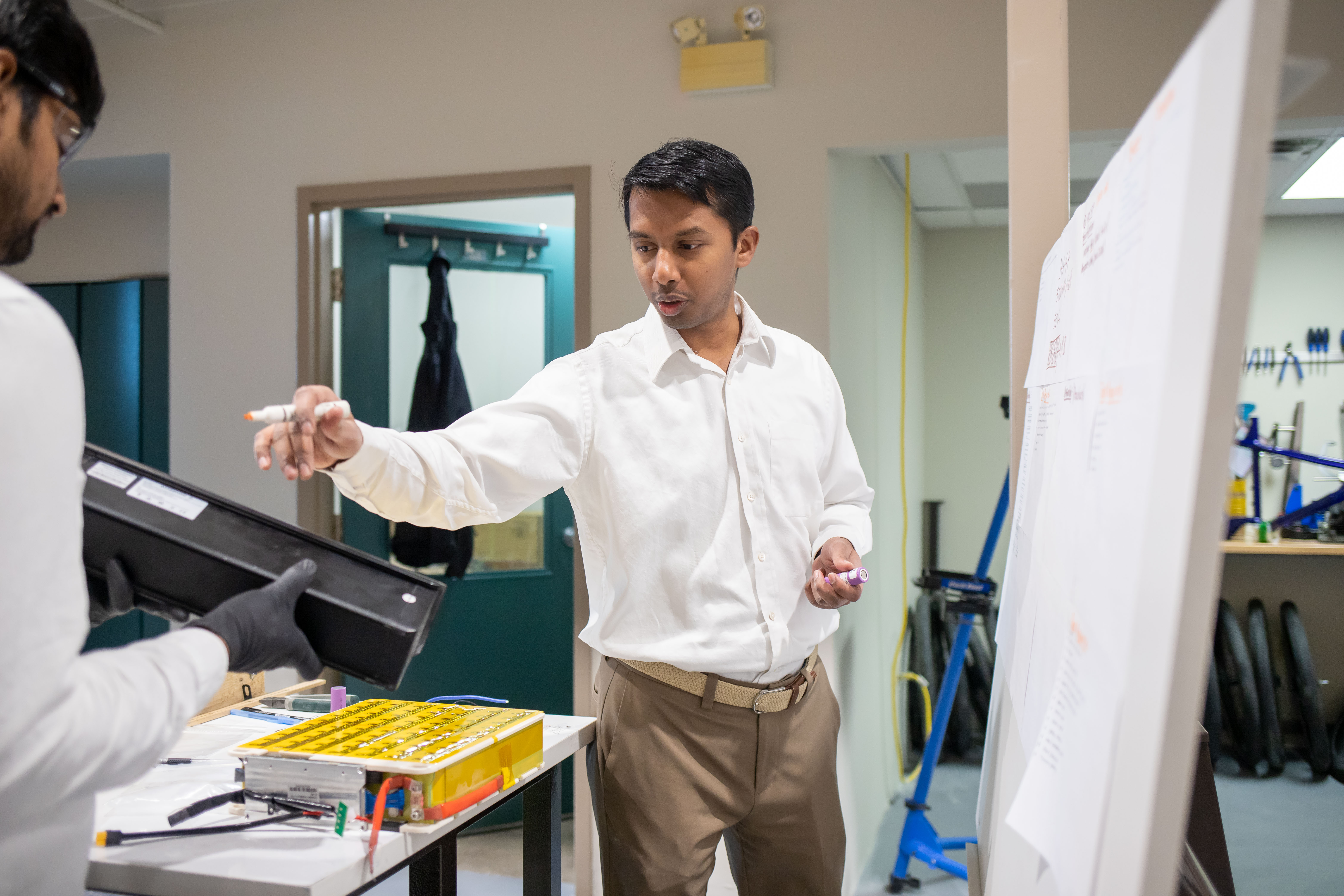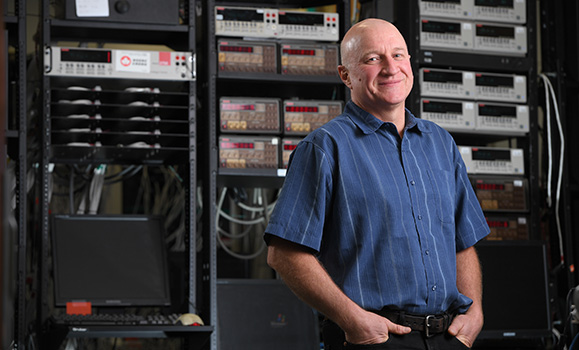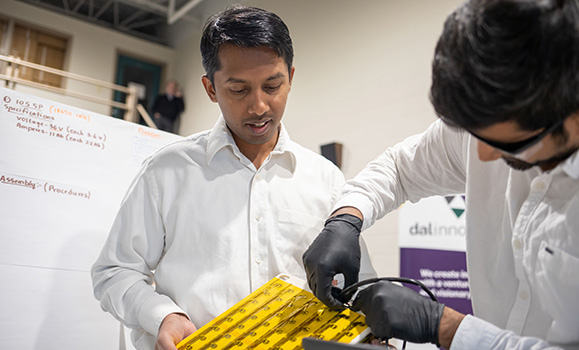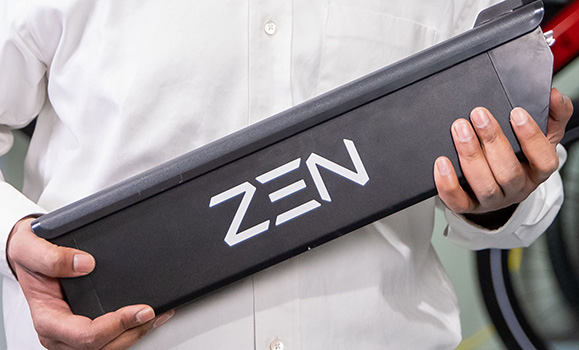THE SNAPSHOT
Dal startup Zen Energy pivoted their business strategy to double down on Dalhousie’s unmatched battery science. Now, after receiving mentorship through Dal Innovates entrepreneurship programs, they’re setting up factory operations in India.
THE CHALLENGE
When Ravi Kempaiah brought his startup  to Dal Innovates’ Lab2Market  program, he intended to leverage its entrepreneurship training to revolutionize the e-bike market. After all, he was an e-bike evangelist. During his PhD at the University of Illinois Chicago, the engineer became a convert commuting to his lab each day.
 Ravi Kempaiah, CEO of Zen Electric and Dalhousie postdoctoral fellow. (Cody Turner image)
Ravi Kempaiah, CEO of Zen Electric and Dalhousie postdoctoral fellow. (Cody Turner image)
Enamored by the transport’s ease and efficiency, in 2016 he set off on a mission to promote the e-bike advantage. It was an  from Madison, Wisconsin to San Diego, California that earned him a Guinness World-Record that stood for seven years.
At the end of the trip, he calculated the cost of the electricity he expended ‚ÄĒ six dollars.
‚ÄúThat was the aha moment. At that point, it became really clear in my mind that this is going to be my future,‚ÄĚ says Kempaiah. ‚ÄúI shifted my focus from material science to true battery material science. I said, I must spend my life on this.‚ÄĚ
He was charged up. But he hadn’t yet fully anticipated which way his current would flow.
THE SOLUTION
With his new mission in mind, Kempaiah focused on finding the best university in the world to research battery science, a search that quickly landed him on Dalhousie’s doorstep.
‚ÄúThere's a chemistry initially developed here by Dr. Jeff Dahn and his research team that is in almost every power tool, laptop, phone, camera, so many things. What started here has changed the world in a lot of ways. It‚Äôs the Mecca of the battery research,‚ÄĚ says Kempaiah.
Dr. Dahn’s research group at Dalhousie are responsible lithium-ion chemistry that is fundamental to battery science. It’s an innovation that his lab continues to build on. In a May 2022 paper published by the  his team details a battery design with the potential to last 100 years.
Kempaiah joined Dahn’ Lab in 2021. In addition to gaining Dr. Dahn as a postdoc supervisor, he added the revered researcher as a scientific advisor and investor. With this guidance, Kempaiah adapted the scientist’s cell technology to meet the needs of the e-bike and scooter market, including an innovation that allows for long battery life in hot climates.

Jeff Dahn. (Danny Abriel photo)
‚ÄúWhen you have hot climates, lithium batteries degrade fast, a couple years when it's above 40 degrees all the time,‚ÄĚ says Dr. Dahn. ‚ÄúSo, this is where you need this long lifetime chemistry, and I think Ravi‚Äôs one of the few people to appreciate how important it is.‚ÄĚ
Indeed, it’s a significant differentiator for Zen which is targeting India and Africa for the future of their business, where temperatures top 40 degrees and almost everyone travels on two wheels.
THE WORK
With the science and inspiration in hand, Kempaiah was ready to build his venture. But says he initially stalled out of the gate, not knowing where to start. ‚ÄúI was new to this ecosystem,‚ÄĚ he says. ‚ÄúSo, I turned to Dal Innovates and its entrepreneurship programs to learn about the nuances of doing business here.‚ÄĚ
Kempaiah says the program embedded him in Canada’s venture creation community and introduced him to opportunities and assistance available to entrepreneurs in the region and country. The mentorship Dal Innovates provided Kempaiah with a fresh perspective on his business. During Dal Innovates’ 12-week Lab2Market  program focused on business model validation the e-bike evangelist had a revelation.

‚ÄúOur mentors said, ‚ÄėRavi, look at the forest, not just a single tree. Look at the real essential ‚Äď the battery that goes into every two-wheeled electric vehicle on the planet,‚Äô‚ÄĚ says Kempaiah.
While his bikes are state-of-art ‚Äď the result of extensive design prototyping during a residency in Dalhousie‚Äôs¬†¬†‚Äď Kempaiah realized Zen‚Äôs batteries are what truly sets the company apart. With a lifetime that is four times longer than today‚Äôs best-in-class batteries for two-wheeled vehicles, he says their product has the potential to become a decisive leader.
So, Kempaiah pivoted. He hasn‚Äôt abandoned e-bikes ‚ÄĒ the company has models that ship across Canada and United States. But now he sees bikes as part of a much bigger business that has batteries at its core.
THE IMPACT
Kempaiah has been travelling the globe meeting with two- and three-wheel electric vehicle manufacturers interested in incorporating Zen’s battery tech. The company is currently setting up factory operations with a partner in India that will allow them to produce 5,000 batteries per month. In 2024, Kempaiah says Zen reached $1 million in revenue. In 2025, he projects that they’ll more than double it.
As they move forward, the company is drawing on the expertise of NOVONIX, another Dalhousie spin-off company that finds its origins in the Jeff Dahn lab. Started by PhD alumnus Chris Burns, NOVONIX is a world-leading developer and supplier of high-performance materials and technologies for the global lithium-ion battery industry. Burns joined Zen as an advisor and will be an important supporter in helping the company design and manufacture the packs that hold their cells.

‚ÄúWe have this amazing opportunity at hand,‚ÄĚ said Kempaiah three days before a recent trip to India. ‚ÄúWe are bringing this Dalhousie battery technology to thousands of batteries in Asia and Africa over the next 12 months. Ultimately this will allow us to continue scaling up our R&D and further develop the battery sector here in Nova Scotia.‚ÄĚ
In the news


